Let’s Change the World: A Conversation with Emiliana Vegas
Video: https://www.youtube.com/watch?v=YnFPN43eKNY
Event hosted by HAED Latin America, Patricia Vázquez del Mercado, Erik Ramírez-Ruiz, y Gustavo Rojas, Co-Directors.
In a dynamic, thought-provoking event, the Harvard Alumni for Education (HAED) Latin American Chapter welcomed Emiliana Vegas, author of Let’s Change the World and Professor of Practice at the Harvard Graduate School of Education (HGSE). Erik Ramírez Co-director of HAED LATAM, guided this conversation, with Gustavo Rojas leading insightful questions from participants spanning across Latin America. Emiliana’s story, filled with resilience, passion, and practical wisdom, left us all inspired to create meaningful change in education and international development.
A Path from Caracas to Cambridge
Emiliana’s journey wasn’t a linear one. Growing up in Caracas, Venezuela, during the 70s and 80s, she was unaware of global organizations like the World Bank or the Inter-American Development Bank (IDB). It wasn’t until she attended Duke University for her master’s studies that she realized her skills in data analysis and policy research could be applied to international development.
“I never planned for this career, but when I saw how research could be applied to real-world policy challenges, I knew I had found my calling,” she shared. Her journey took her through prestigious organizations such as the World Bank, IDB, and Brookings before returning to Harvard.
The Landscape of International Development
Emiliana demystified the world of International Development Organizations (IDOs) by classifying them into five key categories:
1. Global Funders - Institutions like the World Bank and IDB that provide loans and grants.
2. Private Philanthropies - Foundations like Gates and Jacobs that are reshaping development funding.
3. Conveners - Organizations such as the United Nations that set global agendas and foster collaboration.
4. Advisers - Consulting firms that provide technical expertise and policy recommendations.
5. Implementers - Field-based organizations like Save the Children and UNICEF that execute programs on the ground.
“I spent much of my career with global funders because they provide access to high-level policymakers and the resources to implement large-scale solutions,” she explained. But she was also candid about the challenges of navigating inefficiencies within these organizations, offering advice on building networks and fostering resilience.
Making a Difference: Key Projects in Latin America
Two notable projects stood out from Emiliana’s reflections. The first was her work on Chile’s education reforms, initiated under President Michelle Bachelet’s administration. Her team provided critical technical assistance that shaped policies, including the creation of a new Superintendency of Education.
“Seeing our recommendations become part of Chile’s education quality reforms was incredibly rewarding,” she recalled.
The second project took Emiliana deep into the Brazilian Amazon, where children in remote regions travel for hours or even days to attend school. Her team secured $151 million in funding to expand distance learning programs and renovate schools, ensuring access to quality education.
Balancing Career and Family: Navigating Challenges as a Latina Woman
As a Latina balancing traditional family expectations and a demanding career, Emiliana shared her personal challenges and triumphs. Initially, she believed academia would offer her the flexibility to combine research with family life, but her passion for applied fieldwork ultimately drew her into international organizations.
“I wanted both a family and a career, and I’ve had to find ways to make that work,” she reflected. Her honesty resonated deeply with participants, many of whom face similar challenges.
Guidance for the Next Generation
Emiliana offered valuable advice for aspiring professionals interested in making a difference in international development:
1. Develop Strong Analytical Skills: Learn how to interpret data and create actionable recommendations.
2. Hone Communication Skills: Convey complex ideas in accessible ways to different audiences.
3. Master Project Management: Effectively manage time, resources, and teams to achieve impact.
“Rigor with kindness,” Emiliana emphasized, is a key principle she lives by and instills in her students at HGSE.
Why She Wrote “Let’s Change the World” Book
The idea for her book came from a chance meeting with a young professional over coffee. He was seeking advice on navigating international organizations, and Emiliana realized her experiences could benefit others.
“I wanted to share what I’ve learned about how to succeed in these organizations while navigating challenges like bureaucracy and inefficiency,” she said. The book is a blend of career advice, anecdotes, and lessons learned from over 20 years in the field.
The Future of Education and Sustainability
As the event wrapped up, Emiliana reflected on the growing intersection of education and sustainability. She highlighted the dual role of education in teaching students to protect the planet and making school infrastructures greener.
But she acknowledged tensions within global education priorities, particularly between focusing on foundational literacy and numeracy and pursuing holistic education models. “Both are critical,” she noted, “but we must strike the right balance to ensure long-term development.”
A Call to Action
Emiliana’s message was clear: Change is possible when driven by committed individuals with the right guidance and networks. Her story reminded us that impact isn’t immediate, but with perseverance, it can be transformative. For those ready to take the next step, her book *Let’s Change the World* offers a roadmap to making a difference.
We left the session motivated and determined to contribute to global change, inspired by Emiliana’s example.
Let’s Change the World, book: https://www.emilianavegas.com/
About Emiliana Vega: https://www.gse.harvard.edu/directory/faculty/emiliana-vegas

